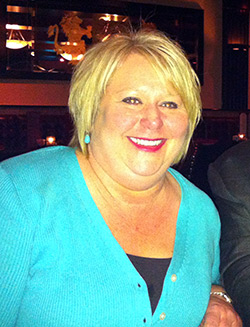Thyroid Cancer Survivor
Explore avenues of support
By Christine Siefers
Stage I follicular thyroid cancer
 One of my doctors told me that if you had to pick a cancer to have, thyroid cancer was a good choice. Of course, I don’t remember voting on this! For me, this all started when I was finally motivated to see my doctor after experiencing depression, tiredness and some scalp issues. After feeling my neck, she thought I had a goiter, but a sonogram showed nodules and heavy blood flow to my thyroid. This led to a CT scan of my neck and ultimately a fine needle biopsy, which returned as “suspicious” for follicular cancer. And because follicular cancer cannot be identified as benign or malignant without removing thyroid tissue, we scheduled surgery.
One of my doctors told me that if you had to pick a cancer to have, thyroid cancer was a good choice. Of course, I don’t remember voting on this! For me, this all started when I was finally motivated to see my doctor after experiencing depression, tiredness and some scalp issues. After feeling my neck, she thought I had a goiter, but a sonogram showed nodules and heavy blood flow to my thyroid. This led to a CT scan of my neck and ultimately a fine needle biopsy, which returned as “suspicious” for follicular cancer. And because follicular cancer cannot be identified as benign or malignant without removing thyroid tissue, we scheduled surgery.
While no cancer is welcomed, I knew my treatment would be manageable once the surgery was over. In the meantime, I spoke with nurses about what to expect and asked questions and even joined an online group of thyroid cancer survivors, who knew what I was going through and were able to calm my nerves.
I also read as much as I could find online about this type of cancer. Prior to surgery, I found a list of symptoms that may indicate malignancy—I had six of the eight symptoms. Based on this, I urged the surgeon to remove the whole thyroid (a total thyroidectomy), even though partial thyroidectomies are usually performed in these cases. Before being wheeled in for the procedure, I locked eyes with my surgeon and said, “Take it all. Trust me.” I’m grateful that he honored my wishes—it saved me from a second surgery. Once I knew it was all gone, I immediately felt better. A pathology report revealed that the tumor was Stage I follicular thyroid cancer.
After the surgery, I started the low-iodine diet to prepare for a radioactive iodine (RAI) treatment, which would kill any remaining thyroid tissue. The RAI required an overnight hospital stay to ensure the radioactive waves coming from my body wouldn’t harm other people. That night was very long and lonely, but came with one silver lining: Mosquitoes wanted nothing to do with me that year!
Things got a lot easier after the first six months. Exercise really helped with my energy level and emotions. When I began to feel more like myself, I got a tattoo of a butterfly (the thyroid is shaped like a butterfly) on my right torso. I take great comfort in this visible reminder of what I’ve endured and overcome. Additionally, I celebrate my “diagnosis day” every year by taking the day off from work and doing whatever I want. Though I don’t suffer from any lasting side effects, I get tested annually, and my endocrinologist also performs a neck sonogram every year to make sure nothing is growing where it shouldn’t.
I have always believed that God doesn’t give us more than we can handle and that my story is not really unique. Many people struggle with far worse things but find a way to go on. My experience with cancer made me a more grateful person and a better caregiver—I’m now more inclined to visit people in the hospital.


